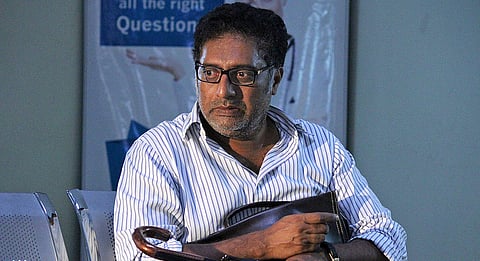
- Reviews
- Power List 2024
- Cannes 2024
- In-Depth Stories
- Web Stories
- News
- FC Lists
- Interviews
- Features
- FC SpecialsFC Specials

Language: Tamil
Director: Priyadarshan
Cast: Prakash Raj, MS Bhaskar, Nasser, Varun, Sriya Reddy, Ashok Selvan
Priyadarshan's Sila Samayangalil (Sometimes) unspools in a format we rarely see in Tamil cinema: the chamber play. A small cast. A single set (a diagnostic centre, for the most part). Imagine something like 12 Angry Men – only quieter, much quieter. Every time we step outside this set – the train station, or the road – the usually unremarkable noises (announcements; a loudspeaker blaring out a devotional song) begin to sound like the scare-music in a horror-movie soundtrack. The dissonance is intentional. The story is about a few people who wait all day for the results of their HIV test. The wait is agonising enough. The pin-drop silence makes it worse. More than one of them worry that they could become an outcast if the result is positive. The silence is a constant reminder of their exclusion from the bustle of "normal" life outside.
The film is a clunky mix of character study and AIDS-awareness drama – and it revolves around Deepa (Sriya Reddy), the receptionist at the centre. This is one of those days where everything that can go wrong is going wrong. She's late for work, and has to plead with her boss (Nasser) to sign the attendance register. The scene is a reminder of Priyadarshan's gift for manufacturing comedy from awkwardness. Deepa opens the register hurriedly and realises she doesn't have a pen. She looks pleadingly at a co-worker, who lends her one. (You can only imagine what might have happened if that co-worker hadn't been present, and if she'd have had to ask her already-mad boss for a pen.) The MS Bhaskar character's exasperation with a man who pretends not to know him (it becomes a bit of a running gag) is another instance of finely tuned comedy arising from the oddities of human behaviour.
[/perfectpullquote]
But the serious portions slip up. Deepa needs money. We know this because she is constantly on the phone with her mother, and her dialogues are essentially chunks of exposition. The narrative often takes the easy way out by making people say things the audience should know. People standing in line complain about Deepa's lateness, which is making one man squirm because he hasn't peed all morning. (They want a sample from his first urination of the day.) We learn about the various ways in which the HIV virus can be transmitted. Most unconvincingly, people reveal to total strangers how they might have been infected. While it's true that we find solace in the presence of others who are in the same situation, the screenplay just drops these confessions without building up to them. Even the characters aren't really built up. They could be called The Punk who Drinks Red Bull, or The Timid Girl with a Rosary.
The melodramatic contrivances are worse. Priyadarshan tries to infuse suspense into the narrative by making us (and the characters) wonder who, among them, has the virus: at one point, it begins to feel like the elimination round in a particularly twisted game show, Who Wants to be a Microbe-carrier! And when they try to bribe Deepa (to get the results soon), there's some drama around how she'll manage this under the eyes of her strict boss. The idea itself isn't bad. You have to find things that keep the plot moving forward. But the execution is off. Ilayaraja has been recruited to inject more drama into the proceedings, when the silence – occasionally interrupted by the chillingly inhuman female voice announcing the next token number – is all the "soundtrack" that's needed.
Sila Samayangalil, finally, is redeemed by the interplay between Balamurugan (Ashok Selvan) and Krishnamurthy (Prakash Raj). Both actors are in fine form, playing these utter opposites. Old vs young. Weary and unshaven versus active and smart. And most interestingly, introvert vs extrovert. Only introverts may truly understand the terror that rises in Krishnamurthy when Balamurugan approaches him and begins to make casual conversation. This is Priyadarshan at his strongest. These exchanges are both heartfelt and amusing, and given Balamurugan's background as a pharmacist, his "information dumps" about AIDS are the least intrusive – they feel folded into the conversations. Balamurugan's confession about how he might have contracted the virus also feels the most convincing. The man really has no boundaries – he craves human interaction like the lung craves oxygen. It's hilarious to watch him ask for a magazine, flip through it in two seconds, and resume looking at the people around him. As if he was the reading type!
I wished the film had been even more of a chamber play, with just these two characters. That might have been risky in a theatrical release, but if Priyadarshan had known Sila Samayangalil would end up directly on Netflix (it went up on May 1), might he have gone this route, been more experimental? But at least, this scene comes to us intact. Balamurugan asks Krishnamurthy if he believes in god. Krishnamurthy hands over a small figurine of the deity bearing his name: Krishna. Balamurugan laughs that Krishna enjoyed the company of 16,008 wives, and He isn't likely to punish Krishnamurthy for one indiscretion. I wondered if this little joke would have found its way to a theatrical screen. Hopefully, streaming platforms will embolden filmmakers to make movies without thinking about the censor board, the HIV that infects Indian cinema.